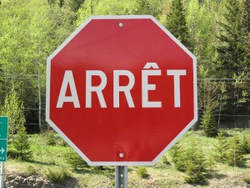Not All French is the Same…

Well, sort of. First, it’s great that you have some basic French in your pocket, because it will be much appreciated in Montreal. It’s true that it’s a very bilingual city, and that most people speak English. but Quebec has a strong French heritage, and a knowledge of French, especially some key Quebecois phrases, will help you a great deal.
- They use a question particle, similar to the Chinese “ma” or Japanese “ka”. This is something that can confuse French speakers, since it is such a deviation. But try to at least understand its usage, and if you can, add it into a sentence or two. One thing is certain: Quebecois generally love it when outsiders show an interest in their language and culture (Don’t we all?).
- Instead of using “monter“, you can use “embarquer” or “débarquer” for really any vehicle. Absolutely for trains and planes, but also for buses and taxis. In French from France, this would only be used for boats. Because of the long history of living by rivers, and strong usage of canoes, the people of Quebec have strong ties to nautical terms for any vehicle.
- In Quebec, the order of the meals eaten during the day are: déjeuner, dîner, souper. This is quite different from the French you most likely learned in school, which would have included le petit déjeuner, déjeuner, dîner. Make sure you remember that your Quebecois friends will be eating their “dîner” around noon, not in the evening.
- “J’t’apres” means “Je suis en train de” This can be a little confusing when you hear “apres” and it doesn’t mean “after” but more the idea of “in the middle of”.
- “Liqueur” means soft drink. No liquor is involved.
- When you want the bill to come after a meal, you ask for “le facteur” not “l’addition“
And, as always, we invite you to follow us on social media: We’re active on Twitter and Facebook.

 RSS Feed
RSS Feed